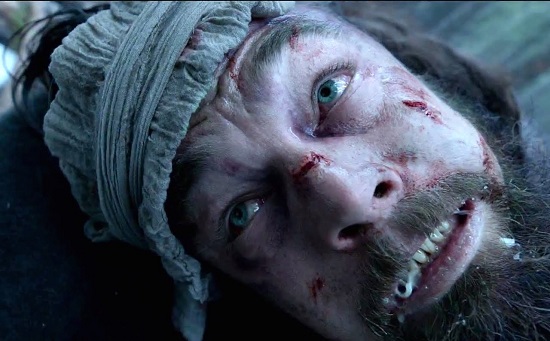Near halfway through The Revenant, having already survived the wrath of a raging grizzly bear, Leonardo DiCaprio’s irrepressible Hugh Glass finds himself strewn, exhausted, on a thin bank of what’s presumably the Missouri River. He’s been put through the mill, but he’s recovering, and with a tribe of Arikara warriors – who he’s just narrowly escaped by slipping into the sloshing rapids – on his trail, he’s in need of sustenance. He crawls up a steep slope to a wide plateau and watches a pack of wolves take down a bison, before drifting into sleep. He wakes in the night to a blazing fire, in the glow of which a Pawnee man is gorging on bloody handfuls of raw bison flesh; the tribesman tosses a chunk in the direction of his new, famished friend.
Alejandro González Iñárritu’s gloriously gory vision of survival and revenge deep in uncharted American wilderness is brimming with mesmeric, unflinchingly real scenes. Reports of the uncompromising demands put on the cast and crew amid freezing conditions have been many, but the results of the extreme measures taken to attain the director’s desired level of authenticity more than justify the means. He’s turned a tale of fierce spirit and endurance into a work of art on an epic scale. It’s like an amalgamation of John Ford, Ansel Adams, Lucio Fulci and Ray Mears.
The narrative is a revamp of the true story of Glass, a 19th-century fur trapper and frontiersman left for dead by the two colleagues charged with caring for him after his devastating run in with the grizzly. Hell bent on vengeance – and with an increased personal incentive in Iñárritu’s embellished take – Glass drags himself from a shallow grave and sets off in pursuit of his deserters. John Fitzgerald and Jim Bridger – played by Tom Hardy and Will Poulter, who each make a good fist of things – are eager to rejoin their company of hunters and its captain (Domhnall Gleeson), who promised them cash for nursing the gravely wounded man through to his last breath. Fitzgerald, a feisty and manipulative southerner, has pinned his hopes on “a decent piece of land” in Texas and means to claim his prize at all costs.
The carnage that follows is unlike anything to have come from the mainstream in recent memory. Despite a budget akin to the latest Marvel instalment, Iñárritu has retained the innovative, singular spirit he wielded with last year’s surprise Oscar hit Birdman. His balance of eccentric ambition and far-reaching appeal makes DiCaprio his ideal lead. The actor’s films consistently gross in excess of £100m in the US, and he’s without a franchised movie to his name. In The Revenant, he’s as ugly as you’ve ever seen him and his quiet, rasping intensity is in blunt contrast to, say, his frantic turn as Jordan Belfort in The Wolf of Wall Street, where he chews hungrily on reams upon reams of relentless script. His versatility is formidable.
Also worthy of particular praise is Emmanuel Lubezki’s cinematography. The shots vary from very close quartered, long sequences, such as those used in a terrifying opening battle scene, to wide-angled contextual imagery that captures the vastness of the unforgiving landscape – not to mention his swirling mists, petering sunlight, haunting woods and wild plants curling from the ice, clinging to life. The immensity of Glass’s journey, both physical and psychological, is perfectly encapsulated in one fell swoop, as the camera pans above a black dot limping in the snow, surrounded by miles and miles of black and white mountains.
The much-talked-about mauling itself is gruesome – primal and brutal in the extreme. With his leg broken and his back and throat torn to shreds, Glass, who has paled to the colour of rancid milk, is sprawled face down in the mud. The bear thumps his club-like paw into the back of the man’s skull, pushing down his mighty weight and sniffing wetly at the camera lens. One reviewer has aptly compared it to a scene from Grizzly Man, when Werner Herzog listens to the audio recording of Timothy Treadwell’s horrific death, but here we see it and it’s the stuff of nightmares.
While there are hints of influence from other films, whether intentional or not – from The Epic of Everest and The Searchers through to The Last of the Mohicans and Gladiator – The Revenant is an original achievement. Its feats in location shooting, in Argentina and North America, are nigh on unparalleled. Iñárritu even had a real-time avalanche initiated for what’s practically a cutaway shot – it’s audacious, compelling work.
The Revenant is in cinemas now


